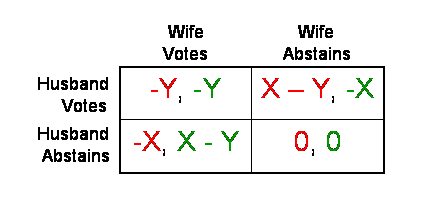People who vote for the other guy aren’t stupid, brainwashed, or evil. They are your friends and family. Someone you love will almost certainly cancel your vote. (My wife cancels out mine.)Now, this raises an interesting question: if you and your spouse’s votes cancel each other out (let’s suppose that they cancel out for every item on the ballot), then wouldn’t everyone be better off – or at least no worse off – if both of you abstained and went on a date instead? The outcome would not change at all, both members of the couple would avoid the cost and inconvenience of voting, and other voters’ wait in line would be shortened by a tiny bit.
Turns out there’s a kind of prisoners’ dilemma at work. Let’s say that each of you places a value of X on having one added vote for your candidate of choice, and negative X on each added vote for the opposition. The cost of voting, in terms of time, effort, and forgone opportunities (like a date) is Y. Assume X > Y, meaning you’d like to vote if doing so actually increased your candidate’s net vote total. And assume you support different candidates, with only two candidates on the ballot. The matrix below shows your payoffs:

The red payoffs are the husband’s, green the wife’s. Notice that each person has voting as a dominant strategy. When the other person is voting, you should vote because - Y > - X; and when the other person is abstaining, you should vote because X – Y > 0. So both spouses vote, and each ends up with – Y. They would both have been better off avoiding the polls and going to a movie. And to the rest of the world, it’s a wash.
The problem generalizes, because your vote can be canceled by anyone voting on the other side, not just your spouse. It would make more sense collectively if people started abstaining in pairs (one person favoring each candidate), until only a number of voters equal to the dominant candidate’s margin of victory remained. For example, if 1,000,036 people preferred candidate A and 1,000,002 preferred candidate B, it would be more efficient if just 34 supporters of A voted and everyone else did something else. The outcome would be no different, and everyone involved would be better off or at least no worse off. Unfortunately, the incentives of the prisoners’ dilemma structure gives people incentives contrary to efficiency.
Is there a way to achieve something closer to the efficient solution? Here is my modest proposal.
Just for record, I realize I’m leaving a lot of things out here. I’m aware that some people consider voter turnout important for its legitimizing effects, though I’ve never found that argument very persuasive. Other people – including me – value participation in the process for its own sake, or for entertainment value, regardless of the impact on the vote total. Still, the current system certainly expends a great deal of resources just to establish a tiny margin of victory.
4 comments:
On the subject of random enfranchisement, are you familiar with the Isaac Asimov short story "Franchise"? It was a near-future SF story in which the art of electoral prediction had become such an exact science that only one actual vote was needed for the computers to decide who would have one the election, so that's all that was actually collected. One man was selected, not at random, but by the computers as the man most representative of the public at large, and given a survey on his opinions of the issues of the day, on the basis of which the election was decided.
Glen,
I think your analysis is missing something very important. Unlike regular one-shot prisoner's dilemmas, this one has an enforcement mechanism: if your significant other finds out you cheated despite your promise not to, the costs of your decision would far outweigh any possible benefits. Plus, you could hangout with your partner all day anyway, just to make sure he or she doesn't sneak off and vote when you're not around.
If you can't trust your significant other to cooperate with the non-voting pact, your relationship is in pretty big trouble.
- Micha Ghertner
This system is somewhat organised within the British House of Commons: MP's from opposing parties "pair" with each other and go off for a drink during routine votes.
Of course, this would not work as well with secret ballots, as a participant could possibly cheat without being detected.
Thank you for the flashbacks to old posts, so we can doubly criticize you--once for the old post and once for the new post. Hey, that's like getting to vote twice! Seriously though, I find your statistical sampling approach a great idea. Unfortunately, It won't happen in our lifetime though because most people don't understand the math. That brings up my main point. A lot of good things don't happen (and bad ones do) because ignorant people are permitted to weigh in on matters of great import by giving them a vote. Therefore, I believe that ignorant people should be disenfranchised from voting. Since I am basically lazy, I will let Glen work out the best method of determining who is smart enough and informed enough to be given a pass to vote. All the better if Glen combines his statistical approach with my ignoranmus reduction appoach (IRA). We can call this new voter reduction plan GEM (Glen's Elimination Method) because it will no doubt be a gem of an idea. Think of the Nobel prize he will get! Please mention me in the footnotes.
--I'm at the Betty Ford Clinic
Post a Comment